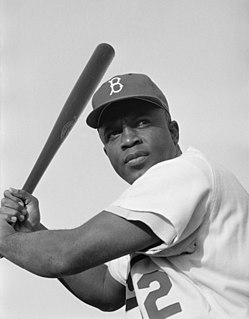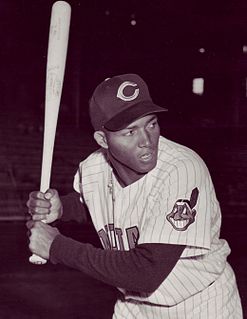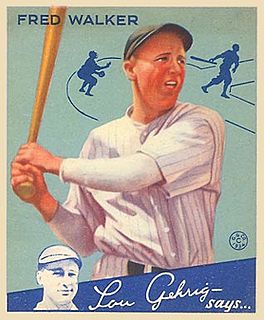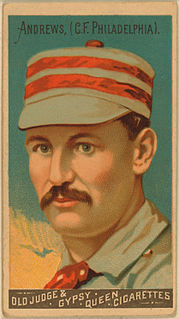Related Research Articles

The Colorado Rockies are an American professional baseball team based in Denver, Colorado. The Rockies compete in Major League Baseball (MLB) as a member club of the National League (NL) West division. The team plays its home baseball games at Coors Field, which is located in the Lower Downtown area of Denver. It is owned by the Monfort brothers and managed by Bud Black.

Jack Roosevelt Robinson was an American professional baseball player who became the first African American to play in Major League Baseball (MLB) in the modern era. Robinson broke the baseball color line when he started at first base for the Brooklyn Dodgers on April 15, 1947. When the Dodgers signed Robinson, they heralded the end of racial segregation in professional baseball that had relegated black players to the Negro leagues since the 1880s. Robinson was inducted into the Baseball Hall of Fame in 1962.

Roberto Enrique Clemente Walker was a Puerto Rican professional baseball right fielder who played 18 seasons in Major League Baseball (MLB) for the Pittsburgh Pirates. He was inducted into the National Baseball Hall of Fame in 1973, becoming both the first Latin American and Caribbean player to be enshrined. His untimely death established the precedent that, as an alternative to the five-year retirement period, a player who has been deceased for at least six months is eligible for entry into the Hall of Fame.
The Negro leagues were United States professional baseball leagues comprising teams of African Americans and, to a lesser extent, Latin Americans. The term may be used broadly to include professional black teams outside the leagues and it may be used narrowly for the seven relatively successful leagues beginning in 1920 that are sometimes termed "Negro Major Leagues".

Lawrence Eugene Doby was an American professional baseball player in the Negro leagues and Major League Baseball (MLB) who was the second black player to break baseball's color barrier and the first black player in the American League. A native of Camden, South Carolina and three-sport all-state athlete while in high school in Paterson, New Jersey, Doby accepted a basketball scholarship from Long Island University. At 17 years of age, he began his professional baseball career with the Newark Eagles as the team's second baseman. Doby joined the United States Navy during World War II. His military service complete, Doby returned to baseball in 1946, and along with teammate Monte Irvin, helped the Eagles win the Negro League World Series.
The history of baseball can be broken down into various aspects: by era, by locale, by organizational-type, game evolution, well as by political and cultural influence. The game evolved from older bat-and-ball games already being played in England by the mid-18th century. This game was brought by immigrants to North America, then they built a stadium to playwhere the modern version developed. By the late 19th century, baseball was widely recognized as the national sport of the United States. Baseball is popular in North America and parts of Central and South America, the Caribbean, and East Asia, particularly in Japan, South Korea, and Taiwan.
The color line, also known as the color barrier, in American baseball excluded players of black African descent from Major League Baseball and its affiliated Minor Leagues until 1947. Racial segregation in professional baseball was sometimes called a gentlemen's agreement, meaning a tacit understanding, as there was no written policy at the highest level of organized baseball, the major leagues. But a high minor league's vote in 1887 against allowing new contracts with black players within its league sent a powerful signal that eventually led to the disappearance of blacks from the sport's other minor leagues later that century, including the low minors.

Victor Pellot, also known professionally as Vic Power, was a Puerto Rican professional baseball first baseman. He played twelve seasons in Major League Baseball (MLB) for the Philadelphia / Kansas City Athletics, Cleveland Indians, Minnesota Twins, Los Angeles / California Angels, and Philadelphia Phillies, from 1954 through 1965. Pellot was the second Puerto Rican of African descent to play in MLB and the second Puerto Rican to play in the American League (AL), following Hiram Gabriel (Sosa) "Hi" Bithorn.

Moses Fleetwood "Fleet" Walker was an American professional baseball catcher who is credited with being one of the first black men to play in Major League Baseball (MLB). A native of Mount Pleasant, Ohio, and a star athlete at Oberlin College as well as the University of Michigan, Walker played for semi-professional and minor league baseball clubs before joining the Toledo Blue Stockings of the American Association (AA) for the 1884 season.

Fred E. "Dixie" Walker was an American professional baseball player, coach, scout and minor league manager. He played as a right fielder in Major League Baseball from 1931 to 1949. Although Walker was a five-time All-Star selection, and won a National League batting championship (1944) as well as an RBI championship (1945) as a member of the Brooklyn Dodgers, his accomplishments as a player were overshadowed by his attempt to keep Jackie Robinson from joining the Dodgers in 1947. He also played for the New York Yankees, Chicago White Sox, Detroit Tigers and Pittsburgh Pirates.
The Lincoln Giants were a Negro league baseball team based in New York City from 1911 through 1930.

John W. "Bud" Fowler was an American baseball player, manager, and club organizer. He is the earliest known African-American player in organized professional baseball; that is, the major leagues and minor leagues.

King Solomon "Sol" White was an American professional baseball infielder, manager and executive, and one of the pioneers of the Negro leagues. An active sportswriter for many years, he wrote the first definitive history of black baseball in 1907. He was elected to the Baseball Hall of Fame in 2006.

George Edward Andrews was a professional baseball player. He was a right-handed second baseman and outfielder over parts of eight seasons (1884–1891) with the Philadelphia Quakers, Indianapolis Hoosiers, Brooklyn Ward's Wonders and Cincinnati Kelly's Killers. He was the National League stolen base champion in 1886 with Philadelphia. For his career, he compiled a .257 batting average, with 278 RBIs, 602 runs scored, and 205 stolen bases.

Weldy Wilberforce Walker, sometimes known as Welday Walker and W. W. Walker, was an American baseball player. In 1884, he became the second African American to play Major League Baseball.
The Southern League of Colored Base Ballists was the first organized Negro baseball league. The league's only year of operation was 1886. Ten teams competed in the league which stretched from Jacksonville, Florida to Memphis, Tennessee with several other southern teams mentioned as possible members in newspaper articles from the period. The leagues appears to have collapsed in early July.
The New York Gorhams were a Negro league baseball team that played from 1886 to 1892. During their short existence the Gorhams grew to be one of the most successful black professional clubs in the country and challenged the supremacy of the Cuban Giants.
In 1950, the Mutual Broadcasting System acquired the television as well as radio broadcast rights to the World Series and All-Star Game for the next six years. Mutual may have been reindulging in dreams of becoming a television network or simply taking advantage of a long-standing business relationship; in either case, the broadcast rights were sold to NBC in time for the following season's games at an enormous profit.

Sunday Afternoon Baseball is the de facto branding used for nationally televised live game telecasts of Major League Baseball games on Sunday afternoons during the regular season.
References
- ↑ Bruns, Roger (April 1, 2012). Negro Leagues Baseball. US: Greenwood. p. 17. ISBN 9780313386497.
- ↑ Zang, David W. (June 1, 1995). Fleet Walker's Divided Heart : The Life of Baseball's First Black Major Leaguer. Lincoln, Nebraska: University of Nebraska Press. p. 96. ISBN 9780803299139.
| This article about an Ohio newspaper is a stub. You can help Wikipedia by expanding it. |